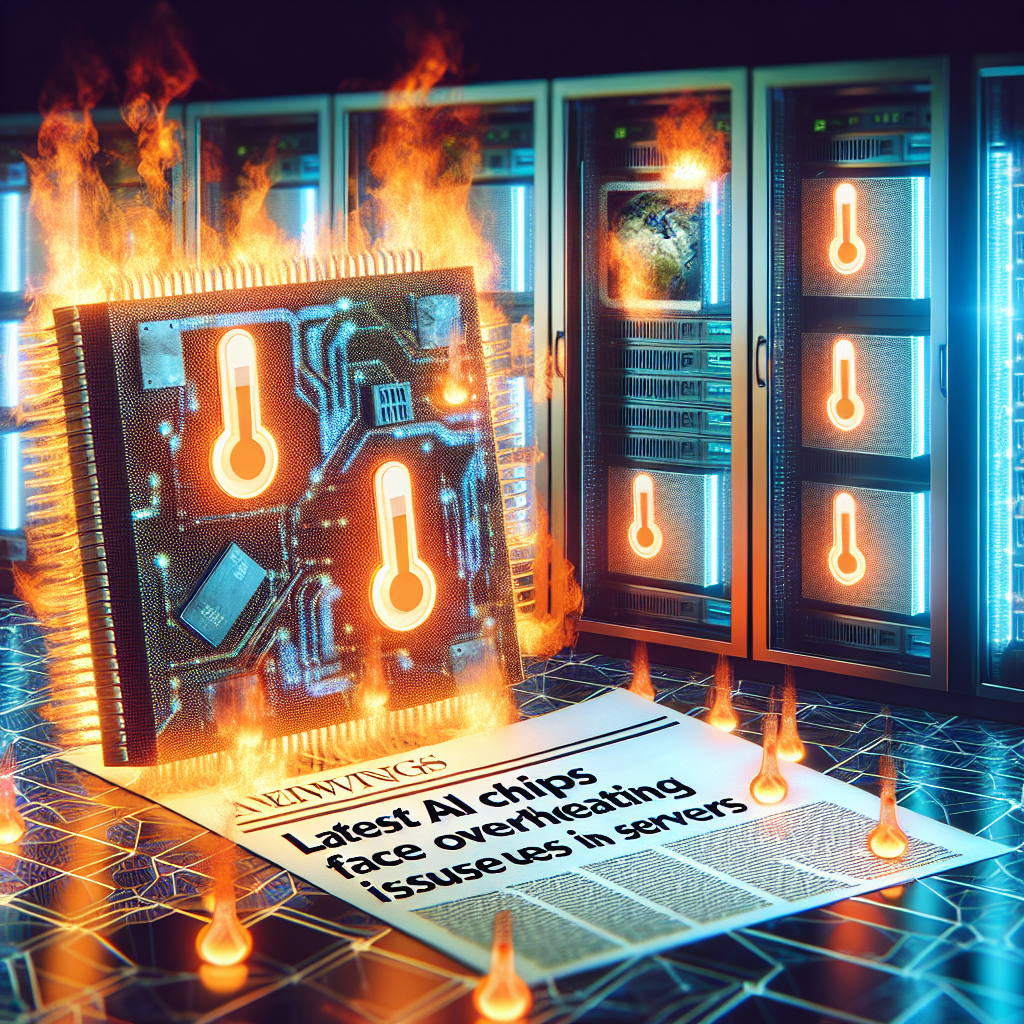“Nvidia’s Cutting-Edge AI Chips Hit a Heat Hurdle: Overheating Concerns in Server Deployments”
Introduction
Nvidia’s latest AI chips, which have been at the forefront of advancing artificial intelligence capabilities, are reportedly facing significant overheating issues when deployed in server environments, according to a report by The Information. These chips, integral to powering complex AI computations and data processing tasks, are encountering thermal management challenges that could impact their performance and reliability. The overheating concerns raise questions about the chips’ efficiency and the potential need for enhanced cooling solutions to ensure optimal operation in data centers. This development comes at a time when demand for robust AI infrastructure is surging, highlighting the critical importance of addressing hardware limitations to maintain technological progress.
Impact Of Overheating On Nvidia’s AI Chip Performance
Nvidia, a leading player in the semiconductor industry, has recently faced challenges with its latest AI chips, as reports from The Information indicate overheating issues in server environments. This development has significant implications for the performance and reliability of Nvidia’s AI chips, which are integral to various high-performance computing applications. As the demand for AI-driven solutions continues to surge, understanding the impact of these overheating issues becomes crucial for stakeholders across the technology sector.
The overheating of AI chips can lead to a cascade of performance-related problems. Primarily, excessive heat can cause chips to throttle their performance to prevent damage, thereby reducing their computational efficiency. This throttling can result in slower processing speeds, which is particularly detrimental in AI applications that require rapid data processing and real-time decision-making. Consequently, the overall performance of AI systems may be compromised, affecting everything from data center operations to autonomous vehicles and advanced robotics.
Moreover, the reliability of AI systems is closely tied to the thermal stability of their components. Overheating can accelerate wear and tear on chips, potentially leading to premature failure. This not only increases maintenance costs but also poses risks to mission-critical applications where system downtime can have severe consequences. For instance, in financial services, where AI algorithms are used for high-frequency trading, any delay or failure could result in significant financial losses. Similarly, in healthcare, AI-driven diagnostic tools must operate flawlessly to ensure patient safety and accurate outcomes.
In addition to performance and reliability concerns, overheating issues can also impact the energy efficiency of AI systems. As chips overheat, they may require additional cooling solutions, which can increase energy consumption and operational costs. This is particularly relevant in data centers, where energy efficiency is a key consideration due to the high costs associated with power and cooling. Increased energy consumption not only affects the bottom line but also raises environmental concerns, as data centers are significant contributors to global energy usage.
Furthermore, the overheating of Nvidia’s AI chips could have broader implications for the company’s market position and reputation. Nvidia has established itself as a leader in AI hardware, and any perceived shortcomings in its products could influence customer trust and loyalty. Competitors may seize this opportunity to promote their own solutions as more reliable or efficient, potentially eroding Nvidia’s market share. Additionally, investors may view these technical challenges as a risk factor, affecting Nvidia’s stock performance and valuation.
To address these issues, Nvidia may need to invest in research and development to enhance the thermal management of its AI chips. This could involve exploring new materials, architectures, or cooling technologies to improve heat dissipation and maintain optimal performance. Collaborating with data center operators and other stakeholders to develop comprehensive solutions could also be beneficial. By proactively addressing these challenges, Nvidia can reinforce its commitment to delivering high-quality, reliable AI hardware.
In conclusion, the overheating issues reported in Nvidia’s latest AI chips present significant challenges that could impact performance, reliability, energy efficiency, and market dynamics. As AI continues to play a pivotal role in various industries, ensuring the thermal stability of AI hardware is essential for maintaining the integrity and efficiency of these systems. Nvidia’s response to these challenges will be closely watched by industry observers, customers, and investors alike, as it navigates this critical juncture in its technological journey.
Solutions To Mitigate Overheating In Nvidia’s AI Chips
Nvidia’s latest AI chips, renowned for their exceptional performance and efficiency, have recently encountered overheating issues in server environments, as reported by The Information. This development has raised concerns among data center operators and technology enthusiasts alike, prompting a search for effective solutions to mitigate these thermal challenges. Addressing overheating in AI chips is crucial not only to maintain optimal performance but also to ensure the longevity and reliability of the hardware.
One of the primary solutions to mitigate overheating in Nvidia’s AI chips involves enhancing the cooling systems within servers. Traditional air cooling methods, while effective to a certain extent, may not suffice for the high thermal output of advanced AI chips. Consequently, liquid cooling systems have emerged as a viable alternative. These systems utilize a liquid coolant to absorb and dissipate heat more efficiently than air, thereby maintaining the chips at a stable operating temperature. By implementing liquid cooling, data centers can significantly reduce the risk of overheating and improve the overall performance of Nvidia’s AI chips.
In addition to upgrading cooling systems, optimizing the server environment can also play a pivotal role in mitigating overheating issues. This involves ensuring adequate airflow within the server racks and maintaining an ambient temperature that supports efficient heat dissipation. Data centers can achieve this by strategically placing servers to prevent hot air recirculation and by employing advanced monitoring systems to track temperature fluctuations in real-time. By maintaining an optimal environment, data centers can enhance the thermal management of Nvidia’s AI chips, thereby reducing the likelihood of overheating.
Moreover, software-based solutions can complement hardware modifications in addressing overheating concerns. Nvidia, along with other industry leaders, is actively developing algorithms and software tools designed to optimize the power consumption and thermal output of AI chips. These tools can dynamically adjust the workload distribution and processing speed based on the thermal conditions, thereby preventing the chips from reaching critical temperatures. By integrating such software solutions, data centers can achieve a more balanced and efficient operation, ultimately mitigating the risk of overheating.
Furthermore, regular maintenance and inspection of server components are essential to ensure the effective functioning of cooling systems and to identify potential issues before they escalate. Dust accumulation and component wear can significantly impair the cooling efficiency, leading to increased thermal stress on the AI chips. Therefore, implementing a routine maintenance schedule that includes cleaning and inspecting cooling systems can help maintain optimal thermal performance and prevent overheating.
Lastly, collaboration between Nvidia and data center operators is crucial in developing tailored solutions that address specific overheating challenges. By sharing insights and feedback, both parties can work towards designing chips and server configurations that are better suited to handle the thermal demands of AI workloads. This collaborative approach not only fosters innovation but also ensures that the solutions developed are practical and effective in real-world scenarios.
In conclusion, while Nvidia’s latest AI chips face overheating issues in servers, a combination of enhanced cooling systems, optimized server environments, software-based solutions, regular maintenance, and collaborative efforts can effectively mitigate these challenges. By adopting these strategies, data centers can ensure the reliable and efficient operation of Nvidia’s AI chips, thereby maximizing their potential and maintaining their competitive edge in the rapidly evolving field of artificial intelligence.
Comparison Of Nvidia’s AI Chips With Competitors Amid Overheating Concerns
Nvidia, a leading name in the field of artificial intelligence and graphics processing, has recently faced scrutiny over reports of overheating issues in its latest AI chips, as reported by The Information. These concerns have sparked a broader discussion about the performance and reliability of Nvidia’s products compared to those of its competitors. As the demand for AI-driven solutions continues to surge, the performance of AI chips becomes increasingly critical, not only for Nvidia but also for its competitors like AMD and Intel, who are vying for dominance in this rapidly evolving market.
To begin with, Nvidia’s AI chips have been at the forefront of technological innovation, powering everything from data centers to autonomous vehicles. The company’s latest offerings, such as the A100 and H100 chips, are designed to handle complex AI workloads with remarkable efficiency. However, the recent reports of overheating have raised questions about their reliability in high-performance environments. Overheating can lead to throttling, where the chip reduces its performance to prevent damage, ultimately affecting the overall efficiency and speed of AI computations. This issue is particularly concerning for data centers, where maintaining optimal performance is crucial for handling large-scale AI tasks.
In contrast, competitors like AMD and Intel have been making significant strides in the AI chip market. AMD’s MI200 series, for instance, has been praised for its energy efficiency and robust performance under demanding conditions. Similarly, Intel’s Gaudi processors, developed by its Habana Labs division, have been gaining traction for their ability to deliver high performance while maintaining thermal stability. These advancements by Nvidia’s competitors highlight the importance of balancing performance with thermal management, a challenge that Nvidia is currently grappling with.
Moreover, the overheating issues reported in Nvidia’s chips could potentially impact the company’s reputation and market share. As businesses and researchers increasingly rely on AI for critical operations, the reliability of AI hardware becomes a paramount concern. If Nvidia fails to address these thermal challenges promptly, it risks losing ground to competitors who can offer more stable and efficient solutions. This situation underscores the competitive nature of the AI chip market, where innovation and reliability are key differentiators.
Nevertheless, it is important to note that Nvidia has a strong track record of addressing technical challenges and delivering cutting-edge solutions. The company has already announced plans to investigate the overheating issues and implement necessary design improvements. This proactive approach is likely to reassure customers and stakeholders, demonstrating Nvidia’s commitment to maintaining its leadership position in the AI chip industry.
In conclusion, while Nvidia’s latest AI chips face overheating concerns, the company remains a formidable player in the market. The situation presents an opportunity for competitors like AMD and Intel to capitalize on their strengths in thermal management and performance. However, Nvidia’s history of innovation and problem-solving suggests that it will address these challenges effectively. As the AI chip market continues to evolve, the ability to deliver high-performance, reliable solutions will be crucial for any company aiming to lead in this dynamic field. The coming months will be critical for Nvidia as it works to resolve these issues and reaffirm its position as a leader in AI technology.
Long-term Implications Of Overheating Issues For Nvidia’s Market Position

Nvidia, a leading player in the semiconductor industry, has recently encountered a significant challenge with its latest AI chips, as reported by The Information. These chips, which are integral to the company’s cutting-edge server technology, are reportedly facing overheating issues. This development raises concerns about the long-term implications for Nvidia’s market position, particularly as the demand for AI-driven solutions continues to surge across various sectors.
The overheating problem is not merely a technical hiccup; it poses a substantial risk to Nvidia’s reputation and market share. As the company has been at the forefront of AI innovation, any technical setbacks could potentially undermine its leadership position. The overheating issues could lead to reduced performance and reliability of Nvidia’s AI chips, which are critical components in data centers and cloud computing environments. Consequently, this could result in a loss of confidence among Nvidia’s clientele, who rely on the company’s products for their high-performance computing needs.
Moreover, the timing of these issues is particularly concerning. The global market for AI technology is expanding rapidly, with businesses and governments increasingly investing in AI infrastructure to enhance efficiency and innovation. Nvidia’s chips are a crucial part of this infrastructure, and any perceived flaws could drive customers to explore alternative solutions offered by competitors. Companies such as AMD and Intel, which are also vying for dominance in the AI chip market, may seize this opportunity to capture a larger share of the market by emphasizing the reliability and performance of their own products.
In addition to the immediate impact on customer trust, the overheating issues could have broader financial implications for Nvidia. Addressing these technical problems may require significant investment in research and development to redesign the chips or improve their cooling mechanisms. This could lead to increased production costs and potentially delay the release of future products. Furthermore, if Nvidia is forced to recall or replace affected chips, the financial burden could be substantial, affecting the company’s profitability and stock performance.
The overheating issues also highlight the broader challenges faced by the semiconductor industry as it pushes the boundaries of technology. As chips become more powerful and complex, managing heat dissipation becomes increasingly critical. Nvidia’s experience underscores the importance of investing in advanced cooling technologies and robust testing protocols to ensure the reliability of next-generation chips. This incident may prompt Nvidia and other industry players to prioritize thermal management in their future designs, potentially leading to innovations that could benefit the entire sector.
Despite these challenges, Nvidia’s strong track record of innovation and its established position in the market provide a foundation for recovery. The company has a history of overcoming technical obstacles and delivering groundbreaking products. By addressing the overheating issues promptly and transparently, Nvidia can mitigate the potential damage to its reputation and reassure its customers of its commitment to quality and reliability.
In conclusion, while the overheating issues with Nvidia’s latest AI chips present a significant challenge, they also offer an opportunity for the company to demonstrate its resilience and adaptability. By focusing on resolving these technical problems and maintaining open communication with its stakeholders, Nvidia can safeguard its market position and continue to play a pivotal role in the rapidly evolving AI landscape. As the industry moves forward, the lessons learned from this experience will likely shape the future of AI chip development, ensuring that performance and reliability remain at the forefront of innovation.
User Experiences And Feedback On Nvidia’s Overheating AI Chips
Nvidia, a leading name in the world of graphics processing units and artificial intelligence hardware, has recently faced scrutiny over reports of overheating issues in its latest AI chips. According to The Information, these overheating problems have been observed in server environments, raising concerns among users and industry experts alike. As Nvidia’s AI chips are integral to the performance of high-demand applications, any malfunction can have significant repercussions on operations that rely heavily on these technologies.
Users have reported that the overheating issues primarily occur during intensive computational tasks, which are common in AI and machine learning applications. These tasks require substantial processing power, pushing the chips to their limits and, consequently, generating excessive heat. In some cases, the heat management systems in place have proven inadequate, leading to thermal throttling. This process reduces the chip’s performance to prevent damage, but it also results in slower processing speeds and decreased efficiency, which can be detrimental to businesses that depend on rapid data processing.
Feedback from users has highlighted a range of experiences, with some reporting minor inconveniences while others have faced more severe disruptions. For instance, data centers that operate at full capacity have been particularly affected, as the cumulative heat generated by multiple chips can exacerbate the problem. In these environments, even a slight increase in temperature can lead to significant operational challenges, including potential hardware failures and increased cooling costs. Consequently, some users have had to invest in additional cooling solutions, such as advanced ventilation systems or liquid cooling technologies, to mitigate the risk of overheating.
Moreover, the overheating issues have sparked discussions about the long-term reliability of Nvidia’s AI chips. Users are concerned that prolonged exposure to high temperatures could shorten the lifespan of the chips, leading to more frequent replacements and increased maintenance costs. This has prompted some organizations to reconsider their hardware choices, exploring alternative solutions that might offer better thermal management and reliability.
In response to these concerns, Nvidia has acknowledged the reports and is actively investigating the root causes of the overheating issues. The company has assured users that it is committed to resolving these problems and is working on potential firmware updates or design modifications to enhance the thermal performance of its chips. Nvidia’s proactive approach aims to restore user confidence and ensure that its products continue to meet the high standards expected by its clientele.
Despite these challenges, it is important to note that Nvidia’s AI chips remain at the forefront of technological innovation. They are widely recognized for their exceptional performance and capabilities, which have revolutionized various industries, from autonomous vehicles to healthcare. The current overheating issues, while significant, are seen by many as a temporary setback in the broader context of Nvidia’s contributions to the field of AI.
In conclusion, the reports of overheating in Nvidia’s latest AI chips have prompted a wave of feedback from users, highlighting both the challenges and the potential solutions to this issue. As Nvidia works to address these concerns, the industry will be watching closely to see how the company navigates this situation. Ultimately, the resolution of these problems will be crucial in maintaining Nvidia’s reputation as a leader in AI hardware and ensuring the continued success of its products in the market.
Technical Analysis Of Overheating Causes In Nvidia’s AI Chips
Nvidia, a leading name in the field of artificial intelligence and graphics processing, has recently encountered a significant challenge with its latest AI chips. According to a report by The Information, these advanced chips are facing overheating issues when deployed in server environments. This development has raised concerns among industry experts and users alike, as overheating can lead to reduced performance, potential hardware damage, and increased operational costs due to the need for enhanced cooling solutions.
To understand the root causes of these overheating issues, it is essential to delve into the technical aspects of Nvidia’s AI chips. These chips are designed to handle complex computations and large-scale data processing tasks, which are typical in AI applications. As a result, they are equipped with numerous transistors and operate at high frequencies to deliver the required performance. However, this high level of integration and operational intensity can lead to significant heat generation.
One primary factor contributing to the overheating is the increased power density of these chips. As Nvidia continues to push the boundaries of AI processing capabilities, the power consumption of their chips has also risen. This increase in power consumption directly correlates with higher heat output, which can be challenging to manage, especially in densely packed server environments. Moreover, the miniaturization of chip components, while beneficial for performance, can exacerbate thermal issues as there is less physical space to dissipate heat effectively.
Another contributing factor is the thermal design power (TDP) limitations of existing server infrastructure. Many data centers are equipped with cooling systems designed for previous generations of hardware, which may not be adequate for the latest high-performance AI chips. This mismatch can lead to insufficient cooling, causing the chips to operate at elevated temperatures. Consequently, this can trigger thermal throttling, where the chip reduces its performance to prevent overheating, thereby impacting the overall efficiency of AI workloads.
Furthermore, the complexity of AI workloads themselves can influence the thermal behavior of these chips. AI tasks often involve irregular and unpredictable processing patterns, which can lead to uneven heat distribution across the chip. This uneven distribution can create localized hotspots, further complicating the cooling process. Addressing these hotspots requires advanced thermal management solutions, such as improved heat sinks, liquid cooling systems, or innovative chip packaging techniques that enhance heat dissipation.
In response to these challenges, Nvidia and its partners are likely to explore several strategies to mitigate the overheating issues. These may include optimizing the chip architecture to improve energy efficiency, developing more effective cooling solutions tailored to the specific needs of AI workloads, and collaborating with data center operators to upgrade existing infrastructure. Additionally, software-level optimizations, such as dynamic power management and workload scheduling, could play a crucial role in managing the thermal output of these chips.
In conclusion, while Nvidia’s latest AI chips represent a significant advancement in computational power, the associated overheating issues highlight the need for a holistic approach to thermal management. By addressing the technical causes of overheating and implementing comprehensive solutions, Nvidia can ensure that its chips continue to deliver exceptional performance without compromising reliability or efficiency. As the demand for AI processing power continues to grow, overcoming these thermal challenges will be essential for sustaining the momentum of innovation in the field.
Future Prospects For Nvidia’s AI Chips Post-Overheating Reports
Nvidia, a leading name in the semiconductor industry, has recently faced scrutiny following reports of overheating issues in its latest AI chips, as detailed by The Information. These chips, which are integral to the functioning of high-performance servers, have been at the forefront of Nvidia’s push into the artificial intelligence sector. The overheating concerns have raised questions about the future prospects of Nvidia’s AI chips, particularly in an industry where reliability and efficiency are paramount.
The overheating issue is not just a technical hiccup; it poses significant challenges for Nvidia as it seeks to maintain its competitive edge in the rapidly evolving AI market. The chips in question are designed to handle complex computations and large datasets, which are essential for AI applications. However, when these chips overheat, it can lead to reduced performance, potential hardware damage, and increased operational costs due to the need for additional cooling solutions. Consequently, this could impact the overall efficiency of data centers that rely heavily on Nvidia’s technology.
Despite these challenges, Nvidia’s reputation for innovation and resilience suggests that the company is likely to address these issues with urgency and precision. Historically, Nvidia has demonstrated a strong commitment to research and development, which has enabled it to overcome various technical obstacles. In response to the overheating reports, it is expected that Nvidia will invest in refining its chip design and enhancing its thermal management solutions. This proactive approach could not only resolve the current issues but also lead to the development of more robust and efficient chips in the future.
Moreover, Nvidia’s strategic partnerships and collaborations with other tech giants could play a crucial role in mitigating the impact of these overheating problems. By working closely with server manufacturers and data center operators, Nvidia can gain valuable insights into the practical challenges faced by its customers. This collaborative effort could lead to the co-creation of solutions that optimize the performance of AI chips while minimizing the risk of overheating. Such partnerships could also bolster Nvidia’s reputation as a company that prioritizes customer satisfaction and technological excellence.
In addition to addressing the technical aspects, Nvidia may also need to focus on transparent communication with its stakeholders. By keeping customers, investors, and industry partners informed about the steps being taken to resolve the overheating issues, Nvidia can maintain trust and confidence in its brand. This transparency could be crucial in ensuring that the current challenges do not have a long-term negative impact on the company’s market position.
Looking ahead, the future prospects for Nvidia’s AI chips remain promising, provided the company can effectively navigate the current challenges. The demand for AI technology continues to grow across various sectors, including healthcare, finance, and autonomous vehicles. Nvidia’s expertise in AI and its track record of delivering cutting-edge solutions position it well to capitalize on these opportunities. By addressing the overheating issues and continuing to innovate, Nvidia can reinforce its leadership in the AI chip market and contribute to the advancement of AI technology on a global scale.
In conclusion, while the overheating reports present a significant hurdle for Nvidia, they also offer an opportunity for the company to demonstrate its resilience and commitment to excellence. Through strategic innovation, collaboration, and transparent communication, Nvidia can overcome these challenges and continue to shape the future of AI technology.
Q&A
1. **What is the main issue reported with Nvidia’s latest AI chips?**
Nvidia’s latest AI chips are reportedly facing overheating issues in servers.
2. **Which publication reported the overheating issues of Nvidia’s AI chips?**
The Information reported the overheating issues.
3. **What impact do the overheating issues have on Nvidia’s chips?**
The overheating issues could potentially affect the performance and reliability of Nvidia’s AI chips in server environments.
4. **Are there any specific models of Nvidia chips mentioned in the report?**
The report does not specify which models are affected, but it refers to Nvidia’s latest AI chips.
5. **How might the overheating issues affect Nvidia’s business or reputation?**
Overheating issues could lead to customer dissatisfaction, potential recalls, or damage to Nvidia’s reputation as a leader in AI hardware.
6. **What are potential solutions to address the overheating issues in AI chips?**
Potential solutions could include improved cooling systems, chip design modifications, or software updates to manage heat generation.
7. **Has Nvidia responded to the report about the overheating issues?**
The report does not mention any specific response from Nvidia regarding the overheating issues.
Conclusion
Nvidia’s latest AI chips, which are integral to powering advanced computing tasks in data centers, are reportedly facing overheating issues, according to a report by The Information. These overheating problems could potentially impact the performance and reliability of servers that utilize these chips, posing challenges for data center operators who rely on Nvidia’s technology for AI workloads. The overheating issues may necessitate additional cooling solutions or design adjustments, potentially increasing operational costs and affecting the deployment timelines of AI infrastructure. This development highlights the importance of addressing thermal management in high-performance computing environments to ensure the stability and efficiency of AI systems.





